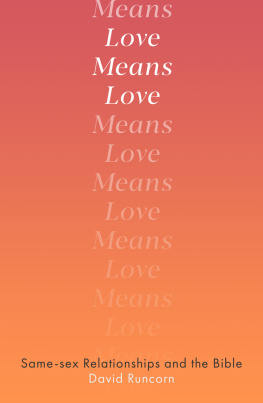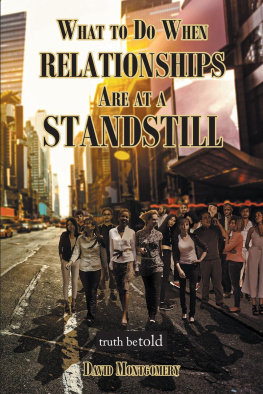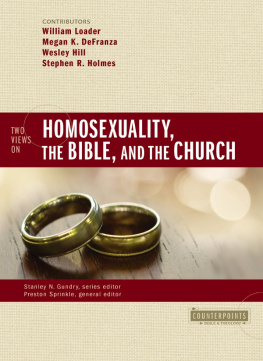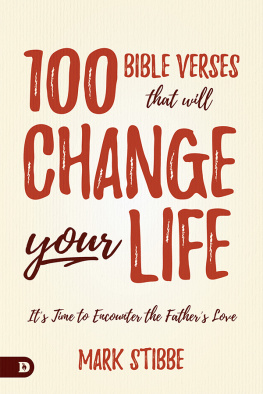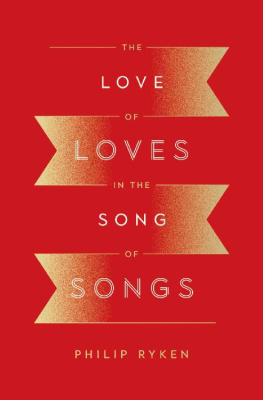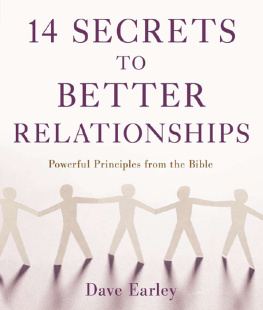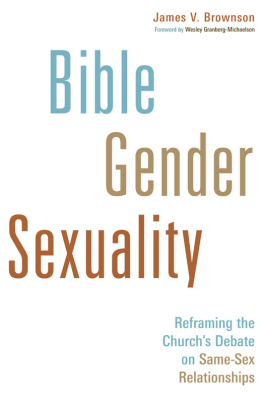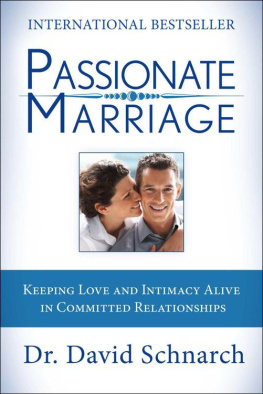I am grateful to a large number of people, representing a variety of views and convictions, who have read all or parts of this book, engaged elsewhere with these themes and offered generous and honest feedback. They include especially Simon, John, Angela, Ali, Bishop David G., Simon, Robert, Bishop David A., Penny, Richard, Bishop Michael, Tudor, Simon, Susannah, Andy, George, Erika and David. Special thanks once again to my dear wife Jackie for her patience and encouragement, living with a husband in obsessive writing mode. Simon Kingston, once again, has been a significant critical friend to the emerging text.
My thanks also to Alison Barr and the publishing team at SPCK for their belief in this project and for enthusiastically bringing it to print.
I want to make special mention of my mentor and dear friend Roger Hurding, who died while this book was in the writing. Its theme was close to his heart. Over the years, despite the confines of long-term severe ill health, his influence as a friend, counsellor and pastoral theologian was profound. He engaged widely and generously on web discussion forums, in personal correspondence and conversation. Roger helped many people to explore an informed shape to their faith and beliefs during times when spaces for trusting and open discussion were not easy to find. His unfailingly gracious tone helped to sustain conversations through strong disagreement. Along with many others, I acknowledge my grateful debt to him over the years. Through his words and presence, many came to a transforming appreciation of the wideness of Gods love. My prayer is that something of his spirit is found in this book.
Love Means Love is published as the Church of England prepares to initiate an extended discussion and teaching programme on identity, relationships and sexuality called Living in Love and Faith (www.churchofengland.org/LLF). Love Means Love is the fruit of a personal journey with the Bible offered to all who are seeking to explore our often conflicted understanding of human being and becoming.
1
On opening doors:
introducing the discussion
This book is written for Christians seeking to understand and live the call of Christ to love one another; and within that calling it is particularly offered for anyone interested in thinking through what Christians believe about the Bible, sex and same-sex relationships.
We, the community of people reading this book, are seeking to work out life and faith in a Church that continues to be deeply divided over what it believes about homosexuality. We are a very varied community. Some of us are gay. Some of us are civil-partnered or married. Some of us are straight. Some of us live on our own, some of us in couples, in intentional communities or in families of all shapes and sizes.
What I assume we have in common, because you have picked up this book, is this: that we want to know what the Bible has to say about human sexuality and, in particular, to understand how the Bible teaches and guides us about same-sex relationships. This subject has become one of the most preoccupying and conflicted issues of our times.
Many of us find ourselves living with a dilemma. We are Christians for whom the Bible is read and reverenced as the guiding authority for life and faith. On the particular issue of sexuality, however, we struggle with, or are no longer able to accept, traditional understandings of what the Bible teaches on same-sex relationships. This is an uncomfortable place to be. We can feel dishonest as we quietly dissent from the apparent plain meaning of certain parts of the Bible or from the convictions we hear preached in church or from views expressed in our own communities. It is hard to gauge our numbers for we have often struggled to know how to bring our voices and questions to this highly conflicted debate. My own experience suggests that we are a significant and growing group.
We are vulnerably aware that our questions present an unsettling challenge to the way the Bible has long been read and understood on this subject. We find it unsettling too. After all, those who believe that the Bible is clear in condemning same-sex relationships have a long history on their side. They can also appeal to what seems to be the plain meaning of the texts. However, these familiar readings are being increasingly challenged. One effect of this is that our questions here extend beyond one particular issue: we are confronted with how we read the Bible at all.
Another challenge we face is that, by opening up this discussion, our fellowship with one another is tested. In having come to believe, as I do, that love means love and that committed same-sex expressions of love may be blessed and good in Gods eyes, I am painfully aware that some of my dearest friends hold a different view.
Some of us belong to churches that believe the Bible forbids same-sex relationships and are very upfront in declaring this. Questions on this issue are not welcome. It takes a certain courage to even raise them in such contexts, especially if we do not feel trained or equipped to do so. For lack of somewhere to explore our questions with others, many of us stay silent, privately dissenting from the prevailing view in communities we call our spiritual home. Some have left churches over this issue; some have been asked to leave.
Across all the traditions there are many other churches that have never expressed a particular view on sexuality but where open and informed discussion has yet to happen. It is a painfully divisive issue. Church leaders and their communities can be tempted to avoid the subject for fear of the conflict it causes, but this silence serves no one well. I have heard too many stories, for example, of parents with a child who is gay or folk who are themselves gay, simply unable to share something so central to their lives with fellow church members for fear of what the reaction would be. Silence also means that people are not being enabled to grow in faith and confidence, to develop an informed understanding of the Scriptures or to read and interpret them. Silence does not communicate nothing. It can and does result in a steady loss of confidence in the Bible as a source of truth, guidance and wisdom.
There are among us those whose personal journeys of faith and identity have left their relationship with the Bible badly damaged. Quite simply, some of us have not found our own story told, loved or understood there and have been left feeling judged and unwelcome. In the absence of being shown any other way of reading and understanding the Scriptures, some have finally given up on them altogether.
We need to open up this discussion without anxiety. We need to learn how to love without fear as we explore new patterns of relating and belonging. We have not been here before. There are still too few open, exploratory places where Bibles can be studied, difficult questions asked, understanding tested out, wounds healed and differences faced respectfully. There are examples of local support and training events designed to help church communities understand what welcome actually means in this context, but more are needed. Welcome is so much more than a word on the church noticeboard or weekly notice sheet.
We find ourselves on this journey of faith and belief for a variety of reasons. If we express a progressive understanding of same-sex relationships, it is often assumed that we must have changed our minds at some point. Not all of us have. Some, like me, have never been convinced by the way the Bible has been interpreted and taught on this subject. But seeking the theological and biblical resources with which to test out our questions has not been easy. An informed understanding takes time. Theology has followed our questions, as it sometimes must.

